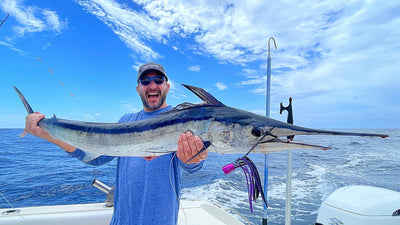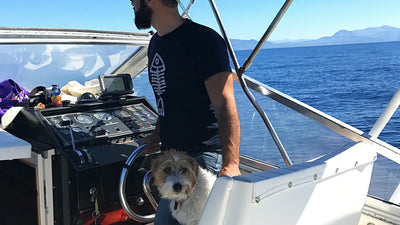If it is true that, with the arrival of the cold, the favorite season of many fishermen also begins, especially those passionate about live bait trolling, but also those who love to dedicate themselves to cephalopods, it is equally true that another good portion of fishermen just can't resign themselves to having to abandon the typical summer techniques, especially deep sea trolling.
There is no point in denying it, those who love deep sea trolling will always see winter techniques as a sort of fallback… in a constant countdown to the start of the new season. And the temptation to cast the rods in the wake even in the middle of winter in search of a fortuitous catch is always strong. On the other hand, we can safely say that many species, especially tuna but also imperial garfish, have now become sedentary all year round … Even if in reality very little is still known about their habits and migrations, and apart from some satellite tagging projects to try to monitor their winter movements, everything comes down to news given by the fishermen themselves, with their catches. And it is a bit of a dog chasing its own tail, as in winter practically no one goes out to deep sea, because it has always been considered a dead period for this technique, but if no one practices it it is impossible to have news of catches that could encourage other fishermen to try. Consequently, if a change in the habits of pelagic fish were to ever occur, or were already underway, we would hardly notice it. It must certainly be said that the water temperature also plays a fundamental role, and the fact that these fish are present all year round does not necessarily mean that they are as active as in the warm period. However, as we have said, the certainty that they are present is now there, and it is such thanks to some news of captures... perhaps some imperial garfish that bites while trolling with live bait or drifting, or some boat that travels under 10 knots of cruising speed, which costs nothing to cast a few fishing rods during its movements.

Winter but not too much
On the one hand, the fish are changing their habits, on the other, the climate is also showing several changes... with the actual winter becoming shorter and shorter, giving us many warm days. And it is not uncommon, especially in some areas of southern Italy, to find yourself in December with short sleeves on a boat in the central hours. This also causes the water temperature to slow down its cooling and, consequently, significantly lengthens the deep-sea fishing season. It is no coincidence that, personally, I have always considered the month of October one of the best, together with the months that mark the beginning of the season. In the last two years, however, I have been able to note (both personally and through news received) a certain activity even in the following months, even in January/February. Now I do not want to say to go out to deep sea with temperatures close to zero, but between the end of November and December, especially on the hottest days, it could be worth it.

Deep Sea Trolling in Winter: When and Where
In winter it will not be easy, nor convenient, to improvise an outing on high seas, or to persist in the idea of going out on a certain day regardless of the weather conditions, just because you may be free from other commitments. The ideal, on the contrary, is to monitor the weather and organize yourself for the day with the highest temperatures, or following a period of good and warm weather, when perhaps a very slight increase in temperatures can be felt even under the surface of the water. And not only that, because if normally the high seas yield more during the hours with the sun high, even more so in this period it is important to be fishing during the peak of the day's temperature... so cast off the moorings comfortably in mid-morning, without the need to get up early. The fishing spots will be the same as in the summer period, perhaps working more in those areas where we have usually recorded catches at the end of the season, but without fear of also going to lower bathymetric levels . In fact, pelagic fish, especially in winter when the coast is empty of boats, do not disdain to approach the coast to feed on squid or small fish. This behavior is especially known for small swordfish, but also the imperial spearfish hang out on low bathymetric levels, and by low I mean even 40/50 meters.
Offshore trolling gear in winter
If the high seas in general are a surprise… in winter it is even more so. Anything could happen, like the episode that happened to a friend who was returning to the port at night, with his rods still fishing, and had a triple strike of tuna… Just as he could bite some nice dolphinfish, still around from the summer period, without excluding swordfish and imperial garfish. Fortuitous events aside, wanting to make our choices with full knowledge of the facts, in order to at least minimally search for our prey, probably the most sensible choice could be to use a mixed setup of tuna and billfish, with at least 6 rods fishing . Obviously those for tuna will be mainly jets like the Jet Monkey , the Cube or the Fat Monkey , while those for billfish will be kona and bullet, with a size between 15 and 30 cm, like the Albacore Tube or the Spearfish Master .




